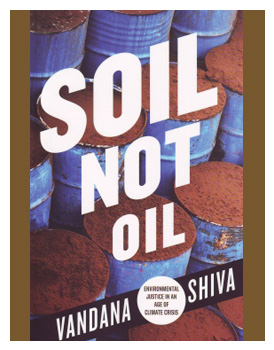Soil, not Oil

Soil, not Oil
Author: Vandana Shiva
Publish year: 2009
When I thought about agriculture in the past, it seemed a simple question of how to produce food that sustains lives. However, we can no longer look at it with only one dimension. In the past fifty years the Green revolution, globalization and industrial farming have made this issue more complex.
Dr Vandana Shiva, the author of "Soil not Oil", points out that the complexity of the global food system is tightly connected to human well-being and the health of Earth, and that in a holistic perspective it is affected by globalization and industrialization. She explains that of the existing industrial farming and globalized food system has become the biggest factor in global warming. We use ten Calories of energy to produce just one Calorie of food, and the other nine Calories create waste and pollution. Large-scale mono-cropping on land not only consumes a huge amount of energy but creates many problems, such as water pollution and the loss of biodiversity, biomass, topsoil and the microelements of the soil, as well as the loss of nutrition for the plants which offer us energy. In addition the over-packaging of food, the increase of food miles (hence carbon footprint), the unsustainable economics of importing and exporting food, local farmers’ loss of self-reliance, and the loss of traditional markets and local diverse culture… all are challenges we should be aware of while facing up to climate change and peak oil. Dr Shiva considers that ecological organic farming, with care for biodiversity, is the crucial solution for the complex problems of the global food system.
After reading “Soil not Oil”, I think these issues are not just a matter for governments and farmers. Every consumer should care about, and have a whole understanding of the complexity of the current global food system, and use their consumer power to support ecological and organic farmers and the Earth, to encourage our economic system, lifestyle and relationship with the Earth to be more sustainable and healthy.
• Book review written by Wang Pin-han, Holistic Education Officer of KFBG


